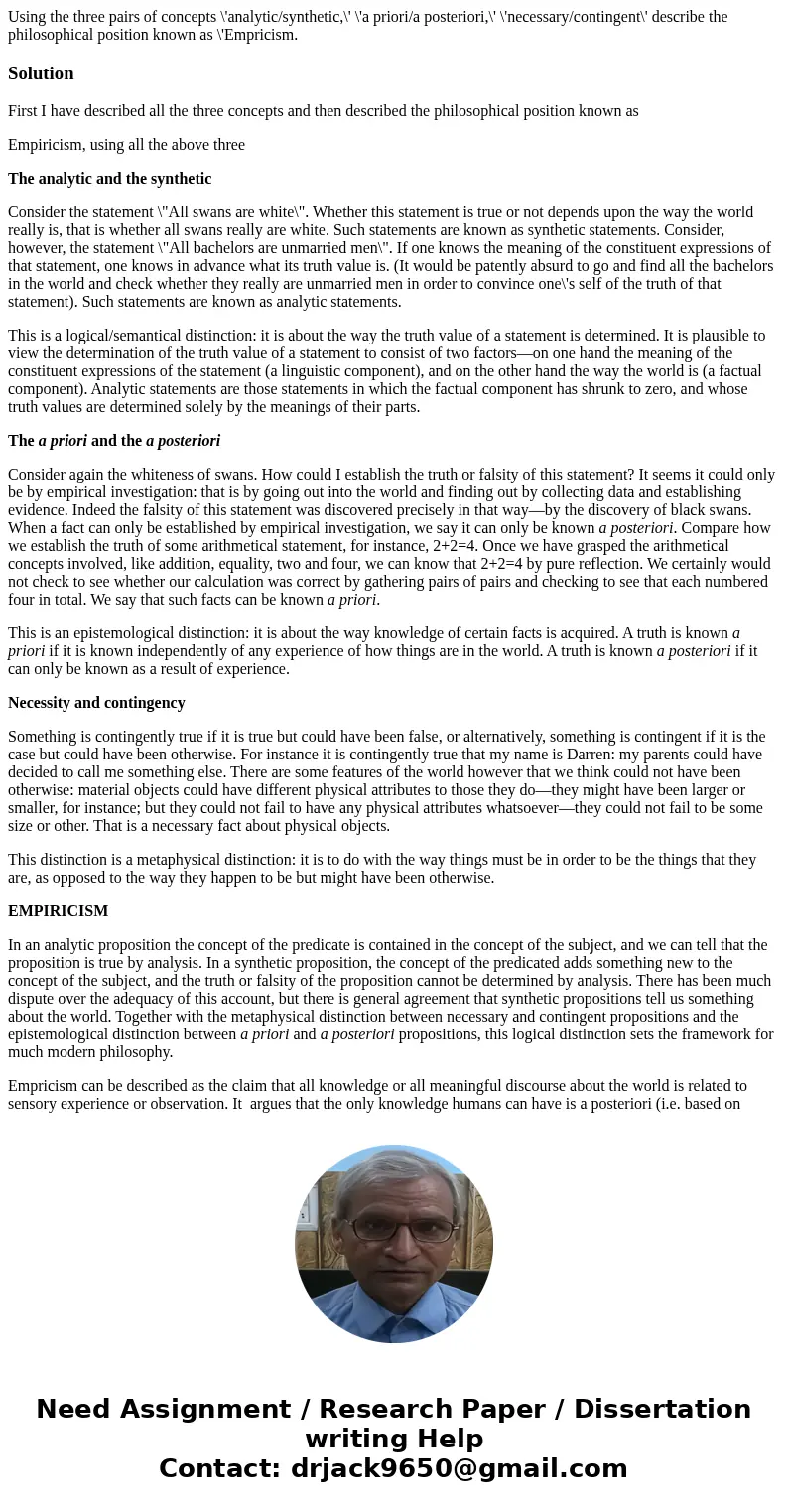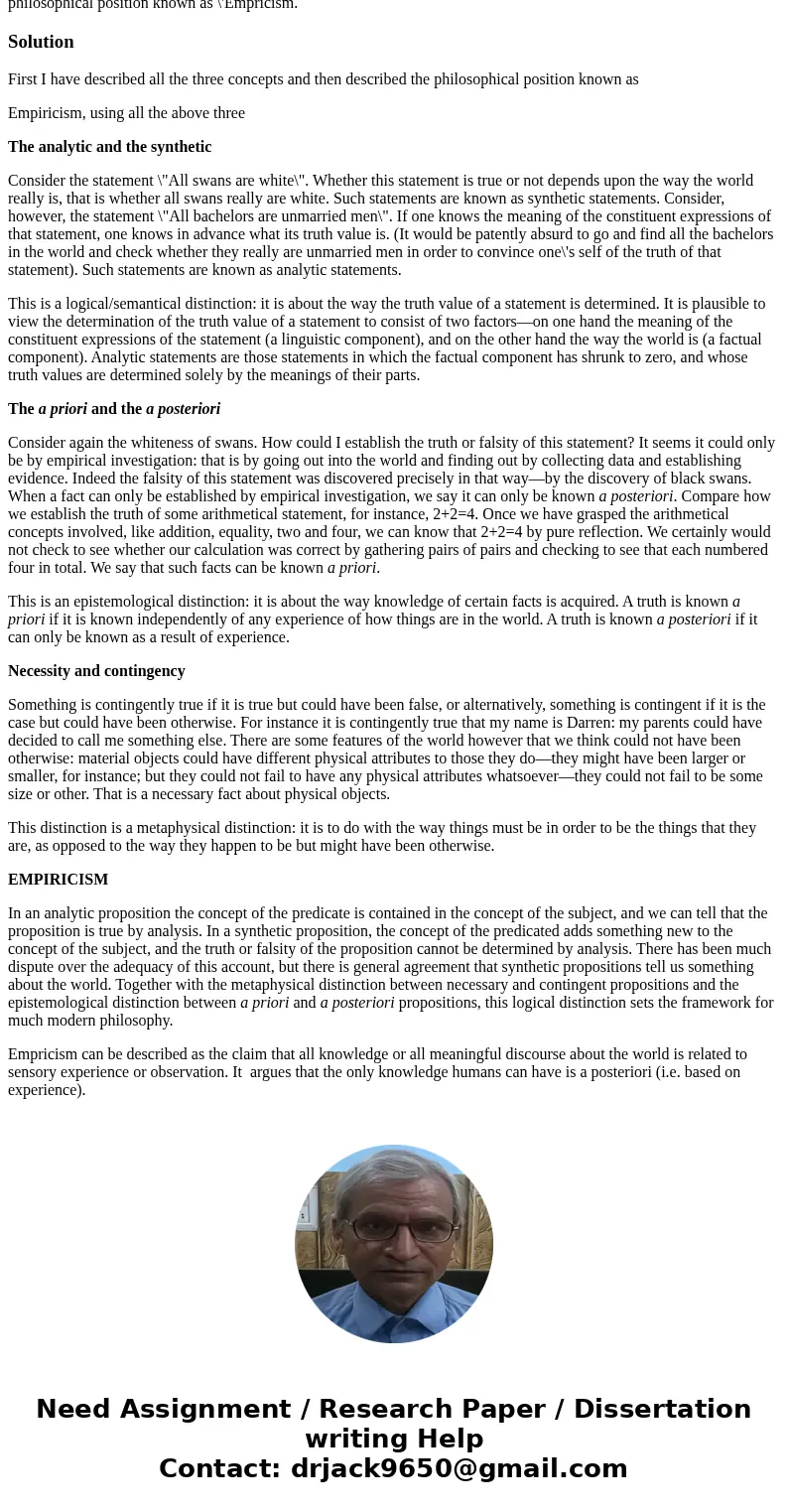Using the three pairs of concepts analyticsynthetic a priori
Using the three pairs of concepts \'analytic/synthetic,\' \'a priori/a posteriori,\' \'necessary/contingent\' describe the philosophical position known as \'Empricism.
Solution
First I have described all the three concepts and then described the philosophical position known as
Empiricism, using all the above three
The analytic and the synthetic
Consider the statement \"All swans are white\". Whether this statement is true or not depends upon the way the world really is, that is whether all swans really are white. Such statements are known as synthetic statements. Consider, however, the statement \"All bachelors are unmarried men\". If one knows the meaning of the constituent expressions of that statement, one knows in advance what its truth value is. (It would be patently absurd to go and find all the bachelors in the world and check whether they really are unmarried men in order to convince one\'s self of the truth of that statement). Such statements are known as analytic statements.
This is a logical/semantical distinction: it is about the way the truth value of a statement is determined. It is plausible to view the determination of the truth value of a statement to consist of two factors—on one hand the meaning of the constituent expressions of the statement (a linguistic component), and on the other hand the way the world is (a factual component). Analytic statements are those statements in which the factual component has shrunk to zero, and whose truth values are determined solely by the meanings of their parts.
The a priori and the a posteriori
Consider again the whiteness of swans. How could I establish the truth or falsity of this statement? It seems it could only be by empirical investigation: that is by going out into the world and finding out by collecting data and establishing evidence. Indeed the falsity of this statement was discovered precisely in that way—by the discovery of black swans. When a fact can only be established by empirical investigation, we say it can only be known a posteriori. Compare how we establish the truth of some arithmetical statement, for instance, 2+2=4. Once we have grasped the arithmetical concepts involved, like addition, equality, two and four, we can know that 2+2=4 by pure reflection. We certainly would not check to see whether our calculation was correct by gathering pairs of pairs and checking to see that each numbered four in total. We say that such facts can be known a priori.
This is an epistemological distinction: it is about the way knowledge of certain facts is acquired. A truth is known a priori if it is known independently of any experience of how things are in the world. A truth is known a posteriori if it can only be known as a result of experience.
Necessity and contingency
Something is contingently true if it is true but could have been false, or alternatively, something is contingent if it is the case but could have been otherwise. For instance it is contingently true that my name is Darren: my parents could have decided to call me something else. There are some features of the world however that we think could not have been otherwise: material objects could have different physical attributes to those they do—they might have been larger or smaller, for instance; but they could not fail to have any physical attributes whatsoever—they could not fail to be some size or other. That is a necessary fact about physical objects.
This distinction is a metaphysical distinction: it is to do with the way things must be in order to be the things that they are, as opposed to the way they happen to be but might have been otherwise.
EMPIRICISM
In an analytic proposition the concept of the predicate is contained in the concept of the subject, and we can tell that the proposition is true by analysis. In a synthetic proposition, the concept of the predicated adds something new to the concept of the subject, and the truth or falsity of the proposition cannot be determined by analysis. There has been much dispute over the adequacy of this account, but there is general agreement that synthetic propositions tell us something about the world. Together with the metaphysical distinction between necessary and contingent propositions and the epistemological distinction between a priori and a posteriori propositions, this logical distinction sets the framework for much modern philosophy.
Empricism can be described as the claim that all knowledge or all meaningful discourse about the world is related to sensory experience or observation. It argues that the only knowledge humans can have is a posteriori (i.e. based on experience).


 Homework Sourse
Homework Sourse